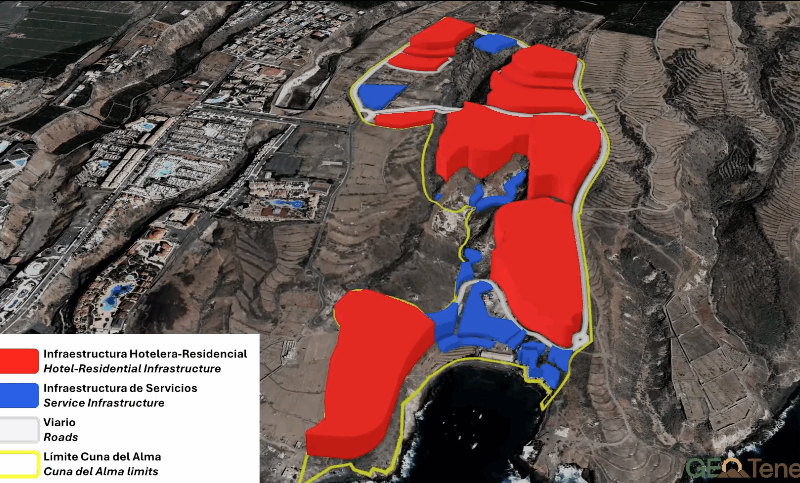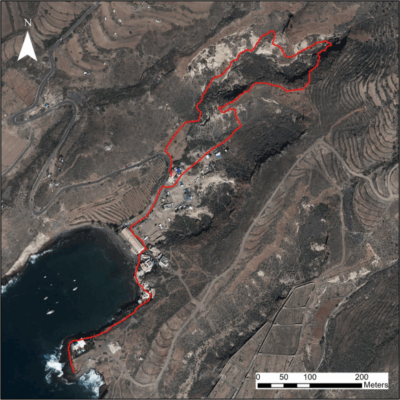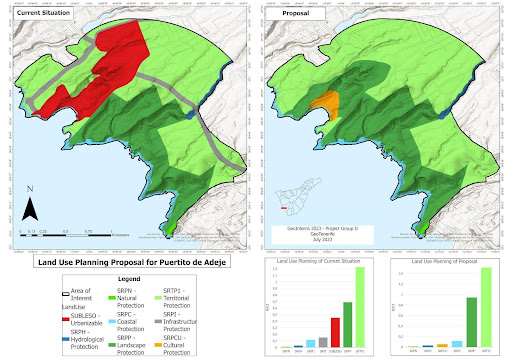What did we Research?
The students and leading local experts taking part in our scientific programmes ‘GeoIntern’ and ‘Marine Science Camp’ of 2022 and 2023 researched and collected data on the following subjects in the El Puertito area. As we continue to research the impact of the potential Cuna del Alma project on El Puertito and residents we will update this page with our new findings.
Hover on one of the boxes to read a summary about the subject and learn where to find out more information.
Geology
The area of Puertito de Adeje has incredible geological formations showing a unique and accessible record of 300,000 years of Tenerife’s oldest highly explosive eruptions in geological deposits called ‘ignimbrites’. Preserving this record is important to define how many highly explosive “Plinian” events Tenerife has experienced to inform emergency management plans for Tenerife’s residents and tourists. To learn more about the geology of El Puertito, see our interactive map below.
Over the past three years, our GeoInterns have been working with Dr Richard Brown of Durham University to uncover evidence of more explosive eruptions than the 20 already on record. This research in Tenerife is also helping to build volcanic resilience globally. Read more about why preserving the ignimbrites is important in the geology section of our report here.
Greenwashing
Greenwashing is the presenting of false claims about the environmental friendliness of a product, service, or project to appeal to customers. A leading expert has analysed the Cuna del Alma website for potential greenwashing practices; Whilst the project claims it will produce 750 jobs, revive the natural environment, and protect biodiversity, what is the reality for the residents and environment? To learn how some claims made on the website misrepresent the development in El Puertito, read the Greenwashing section of our report here.
Habitats of Community Interest
According to the EU Habitat Directive, habitats of community interest are natural areas of significant importance for biodiversity conservation in the European Union. In the Puertito area, there are significant Macaronesian habitats of community interest that could be destroyed. To learn about the habitats of community interest in El Puertito, read our report here.
Legal framework
The land protection of El Puertito was recently changed to reclassify the El Puertito from “Rustic”, a protected land classification which prevents construction, to “Urbanisable”, earmarking the area for development. Despite El Puertito’s natural values and proximity to the La Caleta Site of Scientific Interest and the Teno-Rasca Marine Special Area of Conservation. The land was previously identified as ecologically important but then reclassified to build another large-scale tourist development on the disappearing natural coast of Southern Tenerife. To learn more about Tenerife’s environmental legislation read the Territorial Planning section of our report here.
Resident Opinion
When work on the Cuna del Alma project began in May 2022 weeks of resident and environmental group protests began, which put pressure on the authorities to investigate the project’s impact on the environment. Residents express indignation that land that has been expropriated for 12,000 euros will be redeveloped into a luxury development with villas costing up to 3 Million euros each. To learn more watch our YouTube playlist on how residents feel about the project.
Natura Network
Natura 2000 is an ecological network of protected areas in the EU that protects biodiversity. The marine strip of Teno-Rasca, a Natura 2000 site, protects marine species in the sea of South Tenerife. This high level of protection is based on the marine biodiversity, with various dolphins and turtle species like the loggerhead turtle. Moreover, the diversity of the Teno-Rasca Special Area of Conservation (SAC) has been recognized as a Whale Heritage site by the World Cetacean Alliance (WCA).
This Special Area of Conservation is threatened by the construction of the Cuna del Alma project; to find out more, read our report.
Vegetation and soil
Puertito de Adeje is one of the few stretches of the southwest coast that is largely unchanged and a haven for rare native plants, especially the tabaibal-cardonal mature community of coastal scrub. Some of these specimens are over 100 years old and cannot simply be replanted elsewhere and the loss of these plants would impact a landscape Tenerife’s residents have been able to enjoy for generations. To learn more about the vegetation use our interactive map below and to learn why preserving the tabaibal-cardinal community is important read the Vegetation and Soil section in our report here.
Planetary Science
The Adeje ignimbrite, which outcrops in El Puertito, holds potential as a planetary analogue; it has been identified as geologically similar to volcanic features on Mars, such as those found in the Jezero Crater and Gusev Crater. The area’s coastal erosion and rock alteration processes are critical to the study of weathering processes on Mars. Preserving the Adeje ignimbrites in El Puertito is crucial for future comparisons with Mars samples, which are expected to return by 2033 through the Mars Sample Return (MSR) Program.
Marine Life
Our December 2023 Research Campaign in collaboration with the Oceanographic Institute and with our Marine Science students researched the marine life present in this area, using underwater drone flights, which could be endangered by the construction of a hotel complex. The seagrass (Cymodocea nodosa) observed in the marine environment of El Puertito is a vital marine ecosystem in sandy bottoms; Seagrass meadows serve as a nursery habitat for fishes and invertebrates. However, the marine environment observed in El Puertito has started to deteriorate due to water contamination. To learn more about the native marine species, invasive algae, and the source of effluent along Southern Tenerife, please read our report here.
Our Interactive Results
We aim to raise awareness about the challenges this area is facing and to inspire collective efforts towards its preservation because Puertito de Adeje is of significant interest to scientists and residents. It has unique bird habitats in the ravines, native plant communities, and evidence of ignimbrites which bear unique testimony of Tenerife’s eruptive history. We believe this area should be protected and propose that the La Caleta Site of Scientific Interest be extended to include El Puertito.
Development timeline
We invite you to dive into this timeline about El Puertito and the proposed Cuna del Alma resort. For more in-depth information on these aspects read our detailed report here.

3D Models of the Environment
We invite you to explore this territory through our 3D digital models of the El Puertito area, which we have created with great enthusiasm in collaboration with Drones4Geology, and hosted freely with open access on the V3Geo site. For additional digital content regarding the area’s flora, fauna and geology, please refer to our interactive map and for more in-depth information on these aspects read our detailed report here.
Model 1 shows the unique record of ignimbrite deposits, lava flows, and fossilised beaches in Puertito de Adeje. Click on the image to access the 3D model.
Model 2 shows the submarine Ignimbrite deposits and lava flows in the Adeje Area. Click on the image below to access the 3D model.
Videos
We invite you to explore these videos of the El Puertito marine environment produced by the students and graduates of our training programmes.
What does the proposed Cuna del Alma hotel complex mean for the residents of Tenerife?
A resident of Tenerife, describes how the tourism industry has, and how the addition of the Cuna del Alma project to the island would affect them, video produced by Sergio Parra, GeoScholar 2023.
An Environmental lawyer’s perspective on the Cuna del Alma project
Featuring Jaime Coello Founder of Canaria Telesforo Foundation Bravo Juan Coello, produced by Natalia Puche-Polo, VolcanoStories content collaborator.
The Geological importance of Puertito de Adeje
This video was produced by Frankie Butler, a graduate of the GeoIntern 2023 scientific programme, and using GeoTenerife footage, talks about why the area of Puertito de Adeje is of great geological value
Underwater drone launched in El Puertito
Drones4Geology and MarineSciCamp students launching an underwater drone to collect video footage of the marine life in El Puertito
Drone footage of El Puertito
Tamsin Backhouse, GeoTenerife’s in-house drone pilot expert took this footage of El Puertito showing the landscape where the Cuna del Alma project.
Interview with Fernando Sabate regarding the Cuna del Alma in El Puertito
Fernando Sabate, Professor of Geography at Universidad La Laguna, Interviewed by Sergio Parra (GeoScholar 2022) regarding the Cuna del Alma project in El Puertito. [En Español]
GeoTenerife interview with ITV about the Cuna del Alma project
Sharon Backhouse and Ignacio Garcia were interviewed by ITV regarding the Cuna del Alma project and sustainable tourism in Tenerife.
Interview with Pedro Dorta, regarding Cuna del Alma
Pedro Dorta, Head of Department, Disaster Risk Reduction and Resilient Cities, Universidad La Laguna, Interviewed by Sergio Parra (GeoScholar 2022).
Interactive map
We invite you to explore this interactive map of the El Puertito area, which includes the results of our geological, vegetation, and marine studies and a hiking trail to help you appreciate the environment of El Puertito.
Our Proposal
El Puertito has been designated as “Land Suitable for Planned Urban Development“, despite neighbouring the La Caleta Site of Scientific Interest and the Teno-Rasca Marine Special Area of Conservation, allowing for the Cuna del Alma project to be accepted despite the land’s environmental significance.
After several GeoTenerife field campaigns, supported by previous studies carried out by Dávila-Harris (2009), IGME, the Spanish Geological Institute, has evaluated and recognised the importance of the geological deposits in El Puertito. El Puertito’s geology is now listed on the Spanish Inventory of Sites of Geological Interest, with a high scientific value and high protection priority.
However, the Cuna del Alma project continues to threaten this area. As construction continues, the resort will encroach further into the Site of Geological Interest. Therefore, to maintain the conservation aims of the currently protected zones, La Caleta and the Teno-Rasca marine zone, and to preserve the unique geology, ecology, and archaeological features of El Puertito, we propose that the La Caleta environmental protection zone be extended to cover El Puertito and to introduce a Cultural Protection Zone to preserve the bay area for it’s importance to residents today and its historical importance to the indigenous inhabitants.
The creation of the Geo-Eco Heritage hiking trail was intended for the sake of conservation of the area; a well-designed trail allows controlled access to the area, providing visitors with the opportunity to experience the natural environment and appreciate its ecological and cultural value while reducing human impact on sensitive areas by directing visitors along specific routes. For this reason, we recommend the construction of the wooden walkway/broadwalk by the Adeje municipality.
Our full report
To learn more about this research, read the report below.
Please share these resources freely with anyone interested in sustainable tourism in Tenerife. We would like to deeply thank our many collaborating researchers and the students of GeoIntern 2023, 2024 and MarineScience Camp 2022, 2023, and 2024 without whom this report would not exist:
Editors: Natalia Puche Polo, VolcanoStories Collaborator, Bsc, Sergio Parra, student of Universidad La Laguna, Ajay Wynne Jones, VolcanoStories Co-ordinator, MSci.
Collaborating Researchers and experts: Dr Katy Chamberlain, Alexis Schwartz, Dr Janine Kripner, Dr Steven Godby, Pablo Dávila Harris, and Fernando Borràs Castelló (Drones4Geology).
Collaborating Students
MarineSciCamp 2022: Marcus Chaknova (University of Oregon)
MarineSciCamp 2023: Silvia Paglia (University of Milano Bicocca), Laurence Lane (University of Leicester)
MarineSciCamp 2024: Adriana Ariza Pardo (The University of Texas at San Antonio) and Rahma Hassan (Birmingham University).
GeoIntern 2023: Sergio Parra-Alfaya (Universidad de La Laguna), Francesca Butler (University of Bristol), Ryan Hill (Royal Holloway University of London), Leah Gingell (University of Hull), Bangran Tang (The University of California, Davis), Will Green (University of Plymouth), Emma Hadré (Universität Kiel CAU), and Emma Badenas (University of Barcelona).
GeoIntern 2024: Leslie Boc (Tufts University), Georgia Hazeldine (Birmingham University), Luis E. Padilla Tovar (Instituto Tecnológico y de Estudios Superiores de Occidente), and Elisabetta Savini (University of West Florida).



